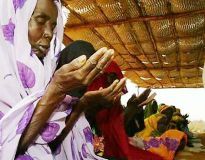Sudan says compromise possible over Darfur hybrid force
May 29, 2007 (KHARTOUM) — Sudan hopes to reach a compromise with the United Nations over a proposed “hybrid” peacekeeping force to bring stability to its war-ravaged Darfur region, a senior Foreign Ministry official said on Tuesday.
 The U.N. Security Council endorsed a plan for a so-called hybrid force last week that envisions more than 23,000 African Union and U.N. troops and police to protect civilians and use force to deter violence.
The U.N. Security Council endorsed a plan for a so-called hybrid force last week that envisions more than 23,000 African Union and U.N. troops and police to protect civilians and use force to deter violence.
“We are cooperating well,” Mutrif Siddig, Sudanese undersecretary for foreign affairs, told Reuters. “It is quite possible we are going to reach a compromise.”
Sudan has said it was studying the proposals, which were handed by U.N. Secretary-General Ban Ki-moon to Sudan’s U.N. ambassador for approval.
The United Nations says at least 200,000 people have been killed and more than 2 million driven from homes in Darfur since ethnic and political conflict flared in 2003 when rebels took up arms against the state, complaining of neglect. Khartoum disputes the figures and says 9,000 people have died.
U.S. President George W. Bush was expected to announce tough new sanctions against Sudan including punitive action against 31 companies and four individuals, according to a draft of his speech.
Siddig said expanded U.S. sanctions would be neither timely nor justified but also would not “at all” affect Sudan’s response to the U.N. hybrid force proposal.
“It seems this is related to domestic politics. … We isolate the U.S. position from the U.N. position,” he said, but added that he feared the move would send a “confusing signal”.
Top Sudanese officials have said the number of troops wanted for a hybrid force was too large and the United Nations should finance and augment a current African Union force of 7,000 with logistics, command and control functions. Khartoum also wants the troops on the ground to be African.
The proposals, from the United Nations and the African Union, have two troop options: one with 19,500 troops composed of 18 infantry battalions, and another with 17,605 troops with 15 infantry battalions.
Police would include 3,772 officers and perhaps an extra 2,500 men to establish a local police force in refugee camps.
One of the main tasks would be to provide security to the tens of thousands living in camps and to patrol humanitarian routes and possibly escort aid convoys that have been attacked regularly by armed groups and militia.
(Reuters)
